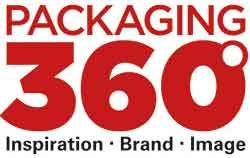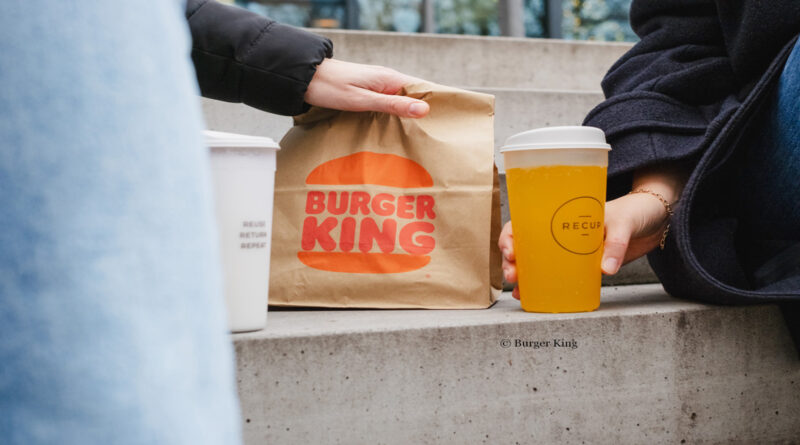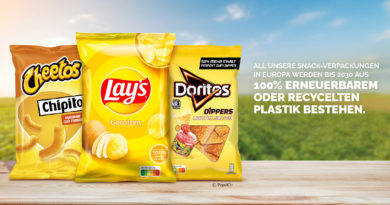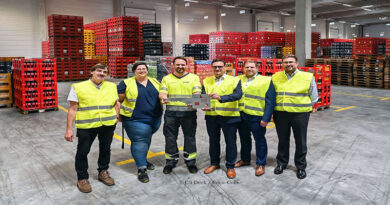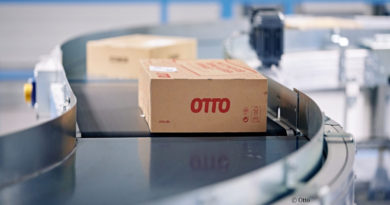There Is No Way Around Reusable Packaging
Retailers, the food service industry, the packaging industry, consumers, politicians, and the judiciary: the issue of reusable packaging is currently occupying many sectors and authorities. In some cases, the road to less waste is still long. But progress is being made.
The fizzy drinks bottle is on the decline, waiting in front of the deposit machine is part of everyday routine. But what if now the jam jar, the cocoa can, and the kebab wrapper can also be returned to retail after consumption? Will the waste garbage cans become emptier? Yes, say the advocates of new reusable systems. No, cry those who prefer to continue to rely on disposables and those for whom the packaging law is too lax. The fact is that almost 350,000 tons of waste are generated each year by disposable cups, disposable tableware, and other packaging for to-go products. Retailers are also in favor of new reusable systems because consumers want to shop more sustainably, as numerous studies have shown. In February 2022, the German Reusable Association was founded with the aim of promoting innovation and research in the reusable packaging sector, developing return and cleaning infrastructures as well as new standards. Furthermore, the climate protection offensive of the German Retail Association (HDE) recently published a guide specifically for food retailers on how to avoid single-use packaging.
Exceptions confirm the rule
The issue is also becoming increasingly important due to legal framework conditions. Particularly in the catering industry. Since January, for example, restaurants, bakeries, or cinemas have had to offer reusable packaging as an alternative for to-go business. However, the customer does not have to accept this. Food and beverages in reusable packaging must not be more expensive than in disposable packaging. However, the caterer can offer a deposit for reusable packaging. The final distributors must take back the reusable packaging that they themselves have placed on the market – but not third-party reusable packaging as a matter of principle.
Smaller businesses with a sales area of no more than 80 square meters and up to five employees are exempt from the reusable packaging obligation. Other exceptions: food that has already been packaged in advance – such as sandwiches – is not subject to the obligation. The Packaging Act also exempts disposable packaging made of pure cardboard and aluminum. Thus, establishments that use paper, pizza boxes, or disposable aluminum trays do not have to offer reusable packaging or fill reusable containers that are brought in.
Survey by Packaging360°
Many restaurateurs and retailers introduced different reusable systems at the turn of the year on the occasion of these new general conditions and are currently still gathering experience, according to a survey conducted by Packaging 360°. Tchibo has launched its own returnable system for deposit cups. “As expected, the usage rate of the deposit cups is still low, but in line with our tests in the run-up – and increasing,” explains Sandra Coy, spokesperson for corporate responsibility at Tchibo. Tchibo, Coy emphasizes, has been “the largest unpackaged coffee chain in Germany for many years.” Customers can bring their own containers or cups for their purchases.
Since the end of December 2022, guests at all German McDonald’s restaurants have had the option of ordering cold and hot drinks, as well as ice cream, in a reusable container when sold in-store or out-of-store. “During our one-year test phase from November 2021 to December 2022, we have already received very positive feedback from our guests on our reusable deposit system. At the current time, the use of the reusable option by our guests is leveling off at a comparatively low level. We have also been able to establish that the reusable usage figures vary greatly depending on the location of our restaurants,” McDonald’s informs us on request.
Burger King also reports a still low usage rate in the single digits but is optimistic that the numbers will increase. Burger King has been offering Recup reusable cups for hot and cold drinks, as well as for ice cream and shakes, in all 750 of its stores since January. The cups can be returned to more than 20,000 collection points across Germany. “We see that our guests are accepting the reusable cups well,” says Daniel Polte, Manager Public Relations at Burger King Deutschland GmbH. Employees have also shown great interest. “Certainly, the processes are not yet completely routine – that is only understandable when introducing a reusable system,” says Polte.
Since the beginning of the year, the Nordsee restaurant chain has been offering Relevo reusable solutions in all its German stores. Lending via the user’s smartphone, deposit-free handling, and the automated reordering process simplify handling in the stores, explains Managing Director Kai Bordel. “As part of the so-called Mak-Pak project, we are also developing sustainably produced packaging solutions in cooperation with the Alfred Wegener Institute, Bremerhaven University of Applied Sciences and other partners: the aim here is to use marine-specific macroalgae raw materials,” Bordel says.
“Reusable is a system system, not a type of packaging”
Criticism of the system and its implementation has come from environmental groups. Thomas Fischer, head of the Circular Economy Division at Deutsche Environmental Action (DUH), finds the implementation of the reusable law flawed. The fact that fast-food stores benefit from the exemption is grotesque, he says. “The law runs into the void at this point.” In addition, he says, the reusable obligation is still too easy for restaurateurs to circumvent by withholding information on the reusable offer, offering isolated solutions that are unsuitable in practice, and not making incentives for reusable use. In this way, companies can fulfill their legal obligations and at the same time keep reusable containers at bay. DUH had carried out random checks and found blatant violations.
“We are also currently taking action against these businesses with cease-and-desist letters.” DUH is a consumer protection association that is entitled to file a lawsuit. Actually, it is the responsibility of the regulatory authorities to control the adherence to the reusable packaging requirement. So far, the DUH does not, however, have the impression that this takes place sufficiently. Fischer emphasizes that “reusable packaging is a system, not a type of packaging. There should therefore be uniform return systems for reusable containers.” In order to curb packaging waste, DUH believes that a fee for disposable containers “of at least 20 cents, or better yet 50 cents, should be charged, as is already done in Tübingen. Then reusable packaging would be a real alternative. That will work wonders.”
Meanwhile, the food service industry points to high burdens for businesses. “The new reusable offer obligation is associated with considerable organizational and logistical effort for the businesses,” explaines the general manager of the German Hotel and Restaurant Association (Dehoga), Ingrid Hartges. One person who was able to react calmly to the new mandatory reusable packaging is David Baumgartner, CEO of Dean & David Franchise GmbH. This is because the stores have been offering salads and bowls in recyclable reusable boxes since 2007. For a deposit of now 8 euros, the containers are available from Recup. “As an additional incentive, our guests even get an add on for free with it. At the time when it was first introduced, many thought we were crazy. In the meantime, it has been copied by many or rightly set as standard by the legislator,” says Baumgartner.
Consumer goods giant Nestlé, in collaboration with the start-up “Circolution” and companies from the packaging industry, has developed reusable stainless-steel packaging that is used in the food trade. As with reusable bottles, people pay a deposit on these packages, hand them in at the deposit machine after use and get money back. Several Rewe stores are currently testing the cups called “Anita in Steel” – initially with Nestlé’s “Nesquik” brand and cocoa and coffee from the Frankfurt-based coffee roasting company “Hoppenworth & Ploch.” “Our system relies on standardization and is open to all food producers – large or small, organic or conventional, brand or private label. This is very important to us, otherwise reusable packaging makes no sense,” says Max Bannasch, co-founder and CEO of Circolution. Circolution rents the reusable containers to food manufacturers for a packaging-as-a-service fee, takes care of cleaning, inspection, and transportation, and provides data for measuring environmental impact.
by Anna Ntemiris
